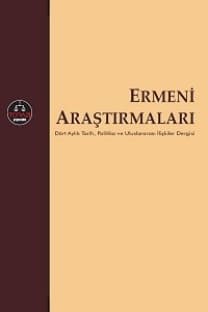AİHM’İN PERİNÇEK KARARI: “SOYKIRIM İNKÂRI”/İFADE ÖZGÜRLÜĞÜ İKİLEMİNİN AŞILABİLİRLİĞİ
Avrupa İnsan Hakları Mahkemesi, Avrupa İnsanHakları Sözleşmesi, Perinçek-İsviçre Davası, ifade özgürlüğü, nefretsöylemi
(REASONS BEHIND THE RELOCATION OF ARMENIANS)
European Court of Human Rights, European Convention onHuman Rights, Perincek v. Switzerland, freedom of speech, hate speech,
___
- Case of Vajnai v. Hungary (33629/06, judgment of 8 july 2008.
- Castells v. Spain, Judgment of 23 april 1992.
- Ceylan v. Turkey,(23556/94), judgment of 8 july 1999.
- Conseil Constituionnel, Décision no. 2015-512 QPC du 8 janvier 2016.
- Conseil Constituionnel, Décision no.2012-647 DC du février 2012.
- Couderc, Hachette-Philipacchi c. France (no.40454/07),[GC], arrêt du 10 novembre 2015.
- Fressoz et Roire c. France,(29183/95 [GC], arrêt du 21 janvier 1999.
- Garaudy c. France, no.65831/01 [Déc] 24 juin 2003.
- Giniewski c.France, no. 64016/00, arrêt du 31 janvier 2006.
- Glimmerveen et Hagenbeek c. Pays Bas, no.8348/78,8406/78, Déc. de la Commission 11octobre 1979, DR 18.
- Handyside v. United Kingdom, Application no. 549/72, judgment of 7 december 1976.
- Ireland v. the United Kingdom, Judgment of 18 January 1978 par. 154.
- Janowiec and Others v. Russia, [GC], 5508/07 and 29520/09, judgment of 21 october 2013.
- Kühnen v. Germany, no.12194/86, Déc., DR 56
- Lehideux et Isorni c. France, arrêt du 23 septembre 1998.
- M’Bala M’Bala c. France, [Déc], no. 25239/13, décision du 20 octobre 2015.
- Monnat c. Suisse, 73604/01, arrêt du 21 septembre 2006.
- Norwood v. UK, no. 2813/03, 16. novembre 2004.
- Orban c.France, 20985/05, arrêt du 15 janvier 2009.
- Partidul Comunistilor (Neperecisti) et Ungureanu c. Roumanie, 46626/99, arrêt du 3 Février 2005.
- Pavel Ivanov v. Russia,35222/04 [Déc],20 february 2007.
- Perinçek c. Suisse ( no. 27510/08), [GC], arrêt du 15 octobre 2015.
- Perinçek c. Suisse ( no. 27510/08), arrêt du 17 décembre 2013.
- Seurot c. France, no.57383/00[Déc], 18 mai 2014.
- Sunday Times v. United Kingdom (no.1), judgment of 26 april 1979.
- Vasiliauskas v. Lithuania, [GC], 35343/05, judgment of 20 october 2015.
- İkincil Kaynaklar Affaire Perinçek-Communiqué de Pierre Nora, président de Liberté pour l’Histoire”, Liberté Pourl’ Historie, 5 Novembre 2015.
- Assemble Nationale, Rapport d’information No.1262, 18 novembre 2008,
- Président M. Bernard Acoyer. www.assemblee-nationale.fr/13/rapinfo/i1262.asp Bertrams, Kenneth. et De Broux, Pierre Olivier. “Du Négationnisme au Devoir de Mémoire”, Revue de Droit de l’Université de Bruxelles, vol. 35, 2007.
- Boëton, Marie. “Le négationnisme passé au crible de la Constitution,” La Croix, 8 décembre 2015.
- Boëton, Marie. La contestation des crimes contre l’humanité devant le Conseil Constitutionnel, La Croix, 2015.
- Drzemczewski, Andrew. Quelques Réflexions sur l’Autorité de la Chose Interprétée par la Cour de Strasbourg, Mélanges en l’Honneur de JeanPaul Costa, 2011.
- Flauss, Jean-François. “L’Histoire dans la jurisprudence de la Cour europé- enne des Droits de l’Homme,” Revue Trimestrielle des Droits de, l’Homme 2006.
- Giannopoulos, Christos L. “La Grande Chambre en quête d’un nouveau modus operandi ?”, La Revue des Droits de l’Homme, novembre, 2015. http://revdh.revues.org/1727
- Hochmann, Thomas. “Négationnisme du génocide arménien : défauts et qualités de l’arrêt Perinçek contre Suisse,” Revue des Droits et Libertés Fondamentaux, 2015, Chronique no.27.
- Kuri, Daniel. “La Question du Génocide des Arméniens à l’épreuve de la Grande Chambre de la Cour Européenne des Droits de l’Homme, Commentaire sur l’arrêt Periçek c/ Suisse du 15 Octobre 2015.”, Université de Limoges, 15 Octobre 2015.
- Le Rouzic, Louis – Marie. “Négationnisme, génocide et abus de droit, ” Revue des Droits et Libertés Fondamentaux, 2014, chronique no.11. Liberté pour l’Histoire, appel du 12 décembre 2005.
- Liberté pour l’Histoire, appel du 13 octobre 2008.
- Lobba, Paolo. Criminaliser le négationnisme au-delà de l’Holocauste, Liberté pour l’Histoire, janvier 2013.
- Vigevani, Giulio Enea. “Radici della costituzione e repressione della Shoah,” Associazione Italiana Costituzionalisti, vol.4, april, 2014.
- Voorhoof, Dirk. “Criminal conviction for denying the Armenian genocide in breach with freedom of expression, Grand Chamber confirms,” Strasbourg Observers Blog, October 21, 2015.
- İnternet Sitesi
- Office Fédéral de la Justice. http://www.bj.admin.ch
- ISSN: 1303-068X
- Yayın Aralığı: Yılda 2 Sayı
- Başlangıç: 2001
- Yayıncı: Avrasya İncelemeleri Merkezi
ERMENİLERİN NAHÇIVAN İDDİALARI VE XX. YÜZYIL BAŞLARINDA YAPILAN KATLİAMLARDA BÜYÜK GÜÇLERİN ROLÜ
Katliamlarda Büyük Güçlerin ROLÜ, Emin ŞIHALİYEV
ERMENİ YARDIMSEVER HAYIR CEMİYETİ (ERMENİ CEMİYYET-İ HÂYRİYE-İ UMÛMİYESİ) VE NİZAMNAMESİ
OSMANLI TAHRİR DEFTERLERİNE GÖRE İRAN-AZERBAYCAN ŞEHİRLERİNDE ERMENİLER
1836 TARİHLİ ERMENİ KİLİSESİ NİZAMNAMESİ ÇERÇEVESİNDE ÇARLIK RUSYASI’NIN ERMENİ POLİTİKALARI
Dağlık Karabağ’ın Ermenistan Sovyet Sosyalist Cumhuriyeti’ne
KARABAĞ SORUNUNDA ATEŞKES VE RUSYA
AİHM’İN PERİNÇEK KARARI: “SOYKIRIM İNKÂRI”/İFADE ÖZGÜRLÜĞÜ İKİLEMİNİN AŞILABİLİRLİĞİ
